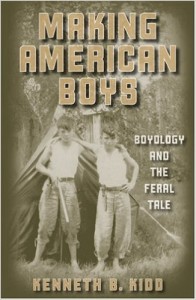Published in: September-October 2004 issue.
 Making American Boys: Boyology and the Feral Male
Making American Boys: Boyology and the Feral Male
by Kenneth Kidd
University of Minnesota Press. 253 pages, $25.95
IT SEEMS appropriate that a gay scholar named Kidd would write a book about “boyology.” The term originates in the early 20th century in pseudo-sociological and pseudo-anthropological studies of boys and their behavior. Kidd’s rather specialized book is an academic, cultural analysis of the construction and the mythology of boyhood. The disciplinary context for Kidd’s work is provided by the last thirty years of feminist, gender, queer, and men’s studies, and he provides useful and sometimes corrective critiques of fictional and quasi-scientific versions of the boy story.






